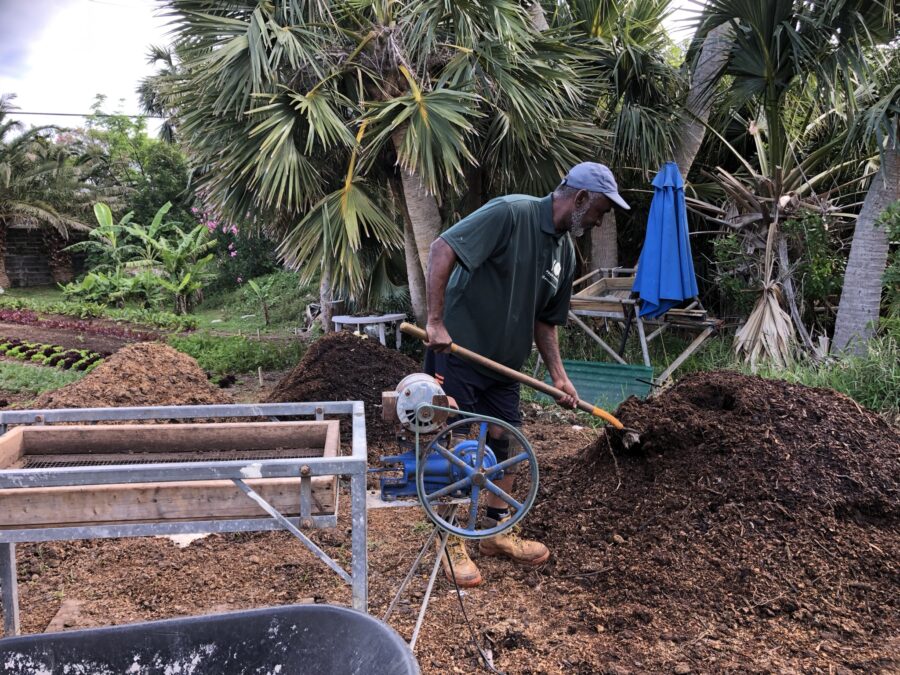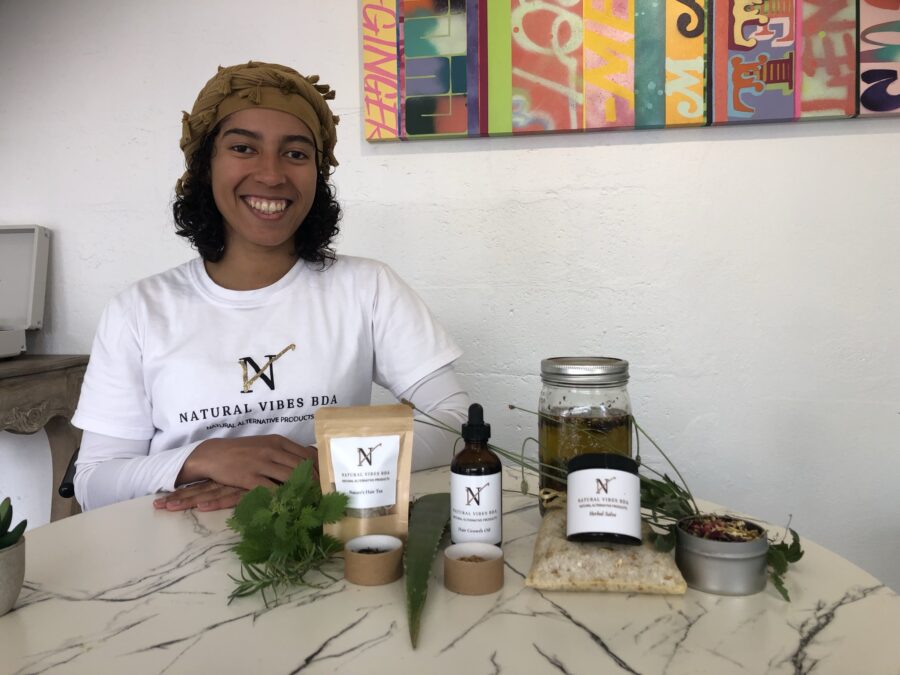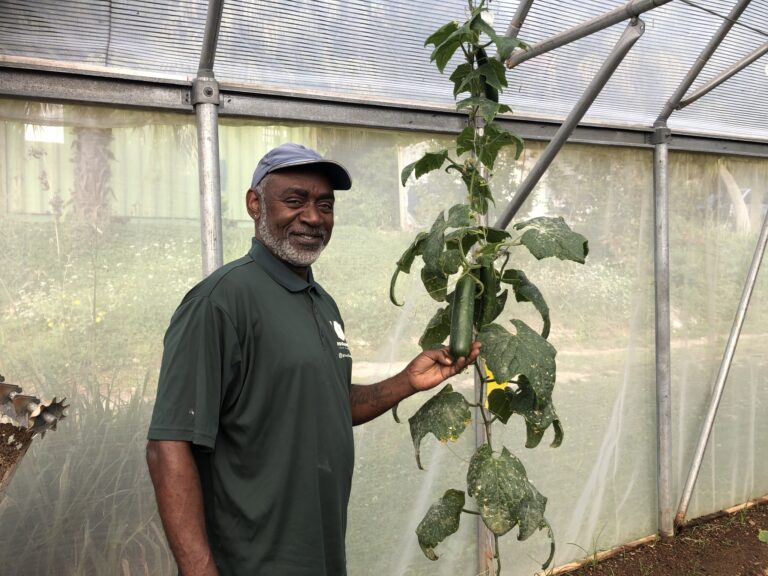It seems that everywhere you turn these days there are articles and videos urging you to eat a healthy diet featuring organic fruits and vegetables.
But, if you have shopped at any island grocery store in the past few months, then you are painfully aware that the price of groceries has risen to the point that more locals than ever before are struggling just to keep food on the table regardless of its nutritional value.
So how can you manage to eat organic vegetables and stretch your grocery dollar all at the same time?
Believe it or not the answer is simply to start growing them yourself.
Greg Wilson, owner of Food Forest on High Point Road in Somerset, recalls a sustainable era in Bermuda during his boyhood where people were taught real life skills and “every house had a vegetable garden and shared food freely.”
 It was this early introduction to growing food that inspired Mr Wilson to establish Food Forest where he specializes in growing organic seedlings and vegetables, composting, and raising chickens for eggs.
It was this early introduction to growing food that inspired Mr Wilson to establish Food Forest where he specializes in growing organic seedlings and vegetables, composting, and raising chickens for eggs.
“Everything you see here is repurposed,” Mr Wilson explained. “I built my slat houses from recycled supplies that I obtained from Tynes Bay, and my compost is composed of grass cuttings and chicken waste.”
“I even harvest my own seeds from the plants that I grow”.
According to Mr Wilson, once upon a time Bermuda had over 3000 acres of arable land but today only about 800 acres remain and only about half of this is actually under cultivation.
“In the 1980’s, when Bermuda started to become affluent, they stopped doing the things that they would normally do.”
To make matters worse, those people who did continue to garden more or less bought into the idea that using chemical pesticides and fertilizers were the way to go because they appeared to cut down on time spent weeding the garden and increased yield.
“Your vegetables might well look bigger if you use chemicals but what you are really eating is food with decreased nutritional value that is laced with chemicals that over time can actually make you sick.”
“Bermuda has a tremendous opportunity to become a regenerative model for the rest of the world. But, for this to happen we all need to understand how Bermuda’s eco-system works so that we can serve as custodians”.
In Mr Wilson’s opinion, however, “you cannot begin to talk about food security in Bermuda until you get rid of all the chemicals being used in local food production, because when you farm with chemicals you are actually contributing to the current health crisis in the local population because the food people are ingesting is laced with pesticides and petrol-chemical fertilizers.”
Conversely, organic compost (which is made from natural biodegradable ingredients) actually helps to improve soil structure and fertility, which can lead to healthier plants and higher yields. They also help to promote beneficial soil micro-organisms, such as bacteria and fungi, that contribute to overall soil health.
Interestingly, Jason and Beth Hollis of www.yardfarmbermuda.com also agree.
Mr Hollis also grew up watching his grandfather growing vegetables, but it was not until Mr Hollis was diagnosed with “leaky gut” – an intestinal condition which weakens intestinal walls and allows toxins to enter the blood stream – that they decided to plant a vegetable garden of their own.
However, the Hollis’ quickly realized that it was difficult to find an accessible source of organic nutrients to support the soil on their property. Determined not to give up, their healing journey led them to search for sources of organic seeds and fertilizer online which they ultimately decided to import and make more accessible for everyone.
Unlike synthetic fertilizers, organic fertilizers release nutrients slowly, allowing plants to absorb them at a steady rate and contain a variety of nutrients, including nitrogen, phosphorus, and potassium – all of which are essential for plant growth and development.
Jason and Beth also stress the importance of creating and using organic compost for enriching the soil, topping up garden beds, and nourishing fruit trees. In no time at all their yield became so big they were producing enough to share with their friends and family.
“I have had to learn creative ways to use all of the things that we grow,” Beth said with a laugh. “I have learned several new ways to serve eggplant – and this past Easter I even made fish cakes with turnips!”
Wild organic plants also have many healing properties when used correctly.
Local plants are not only great for bettering your insides, they make fantastic, healthy beauty products as well. Bermuda has the opportunity to benefit from products made from wild plants foraged right here on island.
 Drawing on a wealth of knowledge regarding the beneficial properties of Bermuda’s plants that has been passed down through her family, Channa Janes, owner of Natural Vibes Bermuda Facebook Group, is studying to become a naturopathic doctor and has been making her own skin care products from natural ingredients since she was a teenager.
Drawing on a wealth of knowledge regarding the beneficial properties of Bermuda’s plants that has been passed down through her family, Channa Janes, owner of Natural Vibes Bermuda Facebook Group, is studying to become a naturopathic doctor and has been making her own skin care products from natural ingredients since she was a teenager.
“It’s important to go back to the basics and start to understand how your body and nature work in harmony together,” explains Ms James. “My life mission has literally become embracing what comes naturally.”
“Our ancestors used so many of the plants in Bermuda, but that knowledge has fallen away.”
“For example, you can make an herbal salve from wild plantain that is good for cuts, burns, insect bites, eczema, diaper rash – and even haemorrhoids. I also make a natural Hair Tea by combining stinging nettles and rosemary which stimulates your scalp, promoting hair growth.”
“By and large, foraged ingredients are free from pesticides and chemicals, but it is important to take the time to learn to identify and then process these plants correctly,” says Ms James – she has spent years testing and perfecting her products in her lab.
Her robust skincare line also includes hair gel, body scrub, cleansing scrub, deodorant, tooth powder, body oil, and more and can be purchased online. Check out Natural Vibes on Facebook, at [email protected], or instagram.com/naturalvibes_bda.

